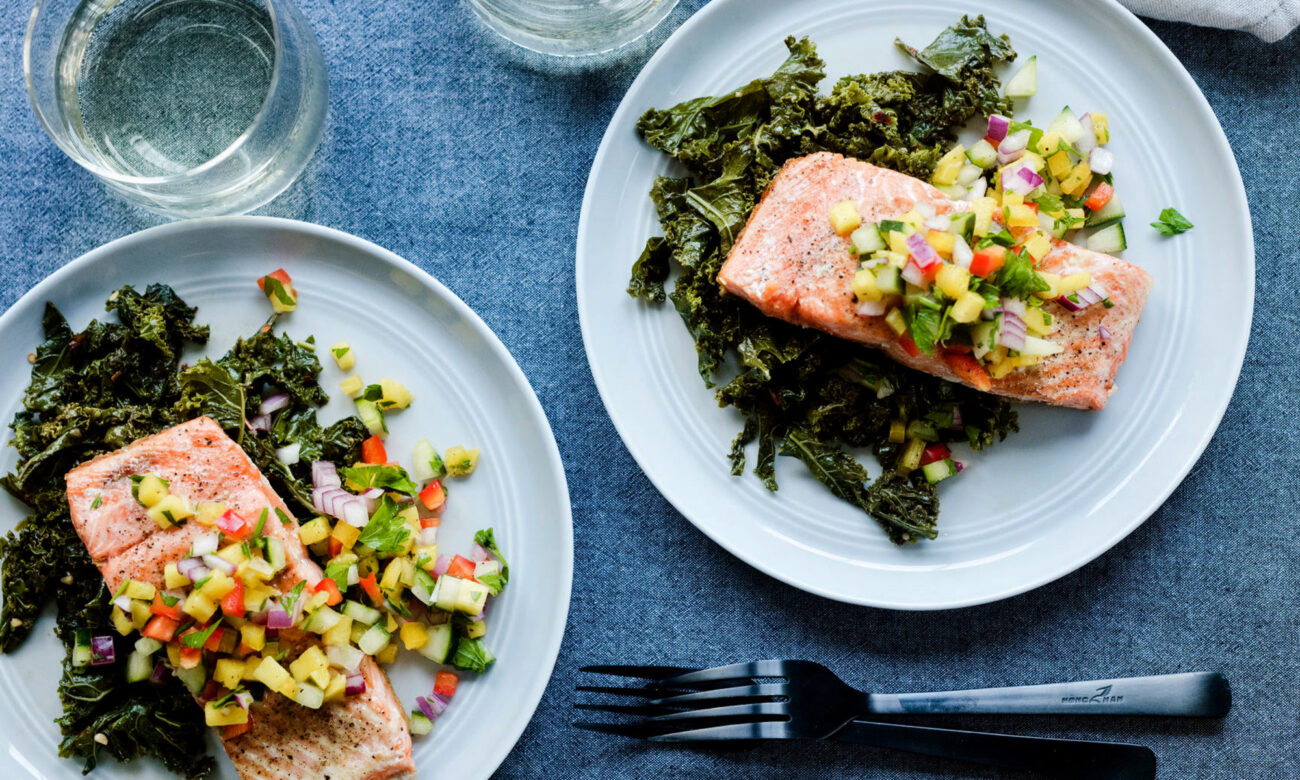Blog
Eat These 7 Foods for a Healthier Gut This Summer

- Summer fruits and veggies like berries, peaches and tomatoes help feed the good bacteria in your belly.
- Foods high in water, like melons and cucumbers, keep your gut happy by helping you stay hydrated.
- Adding fiber-rich and fermented foods to your meals can improve digestion and keep your tummy feeling great.
There’s something about a juicy peach or a sun-warmed tomato that makes me feel like a kid again. As a food writer, I talk about healthy foods year-round, but summer is when the good stuff really shows off. Everything tastes better, it’s picked at peak ripeness or just before, it’s easier to find and it’s usually more budget-friendly.
The connection between what we eat and how our gut feels is remarkable, and the summer harvest gives us a delicious opportunity to nourish the trillions of beneficial bacteria living in our digestive system. These seven seasonal superstars taste amazing because they’re at their finest. But for various reasons, they also pack a powerful punch for your microbiome, helping with everything from digestion and mental health to how your immune system functions.
1. Berries
There’s nothing quite like biting into a perfectly ripe strawberry or a handful of plump blueberries on a hot summer day. These flavorful gems are undoubtedly irresistible, whether tossed into smoothies, sprinkled over yogurt, or enjoyed by the handful. Beyond their deliciousness, berries are true champions of gut health. For one thing, regular consumption of berries increases beneficial gut bacteria, such as Bifidobacteria and Lactobacilli.
“The little seeds in berries are a great source of fiber, and they also pack in hydration and antioxidants,” says Kathleen Garcia-Benson, RDN, CSSD, LD, NASM-CPT, NBC-HWC. “They’re rich in micronutrients that support overall gut and cellular health,” and as a bonus, “they can help satisfy a sweet tooth.” These antioxidants, in the form of polyphenols, support the growth of healthy gut bacteria, reduce inflammation and boost overall health. That’s a lot from these colorful little gems!
2. Stone Fruit
Nothing captures the spirit of summer like a juicy peach dripping down your chin or a perfectly ripe nectarine eaten over the kitchen sink. Stone fruits—including peaches, nectarines, plums, cherries and apricots—have tender, aromatic flesh that makes them perfect for eating fresh, grilling or incorporating into both sweet and savory dishes. “They pair beautifully with protein-rich options like cottage cheese or Greek yogurt…that hits both sweet and savory notes,” enthuses Garcia-Benson.
They’re also a natural “solid source of fiber (especially with the skin on) and excellent for digestion,” she adds. The natural sugars provide easily digestible energy, while the fiber in some fruits feeds beneficial gut bacteria. That fiber gets fermented by microbes in the colon that help grow a more diverse and healthier mix of gut bacteria, which, in turn, helps keep your gut lining and immune system strong.
3. Melons
“Melons are incredibly hydrating and naturally sweet, making them a great choice during the hot summer months,” says Garcia-Benson. “While not high in fiber, they help support regularity by maintaining fluid balance in the gut.” Hydration is essential for digestive health, and melons like cantaloupe and watermelon excel in this area. Both fruits are made up of over 90% water and contain small amounts of valuable electrolytes (including potassium, magnesium and sodium), which help support fluid balance. Adequate fluid intake—often through water-rich foods—is foundational for digestive regularity and a healthy gut environment.
4. Tomatoes
Whether you’re slicing them for a caprese salad, turning them into pico de gallo or slowly roasting them to concentrate their flavors, tomatoes enhance countless dishes. Their versatility is matched only by their nutritional value. Garcia-Benson notes, “They offer hydration when raw and a boost in bioavailable lycopene when cooked.” Lycopene, the compound responsible for the red color of tomatoes, is a powerful antioxidant that can indirectly benefit gut health by reducing systemic inflammation. There’s also promising evidence from animal studies suggesting that lycopene (and tomatoes, in general) may be associated with increased microbial diversity and the growth of short-chain fatty acids (SCFAs) to support a strong gut lining, lower inflammation and contribute to a healthier gut environment.
5. Zucchini and Summer Squash
These mild, adaptable vegetables are summer garden superstars that cook quickly and pair beautifully with virtually any flavor profile. Whether you’re spiralizing them into “zoodles,” grilling them for a smoky char or folding them into a rustic ratatouille, zucchini and summer squash bring a satisfying texture and subtle flavor to countless dishes. “They’re mild in flavor [and] offer both hydration and a bit of fiber,” notes Garcia-Benson. For example, a 100-gram serving of zucchini offers about .8 g of total dietary fiber, including a mix of soluble fiber (which feeds good gut microbes) and insoluble fiber (which adds bulk to stool and supports healthy digestion). For anyone with IBS or other gut sensitivity conditions, “they’re also relatively low in fermentable carbs, making them easier on sensitive stomachs,” she adds.
6. Leeks, Onions & Garlic
Alliums add depth and complexity to meals and are the foundation of countless savory dishes. From the mild sweetness of caramelized onions to the pungent bite of fresh garlic, they’re indispensable in cooking, and the warmer weather brings a wider variety to choose from. But they also happen to be “foundational prebiotic foods,” according to Garcia-Benson. While probiotics introduce beneficial bacteria to the gut, prebiotics act as food for those bacteria to help them thrive. They also support regular bowel movements and enhance the absorption of minerals like calcium and magnesium, which can improve bone health, muscle and nerve function, stress management and sleep quality. One important note: If you live with microbiome imbalance or SIBO, Garcia-Benson warns that these foods might cause excessive gas or bloating. In this case, working with a digestive health dietitian “can help tailor your intake and restore balance.”
7. Cucumbers
Few vegetables are as refreshing and cooling as cucumbers, with their crisp texture and clean, mild flavor. “Cucumbers are packed with water and great for hydration,” says Garcia-Benson. “It’s a cooling vegetable perfect for hot weather and easy to add to meals, but it’s not especially high in fiber, so best paired with other gut-friendly foods.”
While cucumbers aren’t fiber superstars, their high (96%) water content plays a crucial role in digestive health. Every day, we lose water just by living—through our kidneys, through our skin and even simply from breathing. To keep things running smoothly, we need to replenish by drinking plenty of water and eating water-rich foods. When we don’t get enough, our body goes into water-saving survival mode, working harder to conserve every drop. Consistently being “underhydrated” (even mildly) can stress your body over time. For your gut, this means digestion can get sluggish. Proper hydration is vital for maintaining regular bowel movements and enabling your gut to absorb nutrients effectively. There’s growing research suggesting that even mild ongoing dehydration may contribute to more significant, long-term health challenges. All that to say: Staying topped up on hydrating foods is a surprisingly simple yet powerful habit for your overall well-being.
Strategies to Improve Gut Health
You’ve probably heard all of the obvious advice for maintaining a healthy gut, like prioritizing a diverse, plant-rich diet, staying hydrated, getting enough sleep, managing stress, consuming plenty of fiber daily and limiting your intake of foods high in salt, sugar and saturated fat. These are all fantastic strategies, but here are some other ideas you might not have considered.
- Look at your poop: “One helpful tool for bringing more awareness to your gut health is the Bristol Stool Chart,” says Garcia-Benson. “It can give you a general sense of how things are moving through your system. If your bowel movements often fall outside the Type 3 or 4 range, whether they’re consistently harder or looser, it may be a sign that your gut could use some support. You don’t have to aim for perfect digestion every day, but observing patterns can help you connect the dots between food intake, movement and how you feel.
- Chew that food: “Don’t underestimate the power of chewing thoroughly,” emphasizes Garcia-Benson. “Digestion starts in the mouth, and eating too quickly can overwork the rest of the digestive tract.” If you’ve ever rushed through a meal and felt bloated afterward, chewing might be the missing link! Chewing slowly and thoroughly helps mechanically break down the food into smaller particles, making it easier for stomach acids and digestive enzymes to do their job. Chewing also stimulates saliva production, releasing enzymes that begin breaking down carbohydrates right in your mouth.
- Move a bit more: “Gentle movement after meals, like a short walk, can help with digestion and may reduce bloating,” explains Garcia-Benson. Activity helps your digestive muscles push food along, eases bloating, boosts circulation and helps with blood sugar control.
- Breathe: Your body digests best when it’s relaxed. The parasympathetic nervous system, also known as “rest and digest mode,” plays a key role in activating your digestive processes. So, Garcia-Benson explains, “taking a moment to activate the parasympathetic nervous system before eating, through a few deep breaths or simply slowing down, can support digestion by easing your body into [that] ‘rest and digest’ state.” When you’re stressed or rushed, your sympathetic nervous system (aka “fight or flight”) takes over, which can inhibit stomach acid production and slow down digestion.
- Eat more fermented foods: Adding fermented foods (like sauerkraut, kimchi, miso and kombucha) to your diet is a delicious and safe way to boost the beneficial microbes in your gut, which in turn can help improve your overall gut health and may even lower your risk of developing chronic digestive issues over time.
- Avoid unnecessary antibiotic use: While antibiotics can be lifesaving when needed, using them incorrectly or when they aren’t necessary can disrupt your gut microbiome. Antibiotics consistently reduce microbial diversity and lower populations of health-supporting bacteria—and, in many cases, these imbalances can last for months or even years. Always follow your healthcare provider’s guidance and consider probiotic support during and after antibiotic treatment.
- Summer vacation tips: “The two biggest recommendations I give when people are traveling,” Garcia-Benson reveals, “are to stay hydrated and try to get in at least one fiber-rich food at two out of three meals.” This can be as simple as “having fruit at breakfast and a side of veggies or a salad at dinner.” The key, she adds, is being consistent and not aiming for perfection: “Don’t underestimate the power of keeping a few routines in place.” Whether it’s your breakfast choice, a short walk after eating or a consistent wake-up time, Garcia-Benson says that routines act as mini-anchors, helping your gut maintain its rhythm despite schedule changes.
Our Expert Take
Focusing on seasonal summer produce for gut health isn’t just about the nutrients; these foods also offer some practical benefits. “When the gut microbiome is out of balance, symptoms like gas, bloating, constipation or loose stools can impact daily life,” explains Garcia-Benson. “These issues may lead to discomfort, poor sleep and stress, especially if you’re always scanning for the nearest bathroom. Over time, that physical stress can affect mood, concentration and energy levels.” Practically speaking, a well-balanced gut means better nutrient absorption, which is key for your mental clarity and physical energy.
The amount and variety of fresh produce available in summer make it easier than ever to incorporate gut-friendly foods into your routine. By stocking up on these seasonal superstars, you’re eating well and investing in your gut health, which supports your overall well-being, energy levels and quality of life. What gut-friendly summer foods are you excited to add to your grocery list this week?












